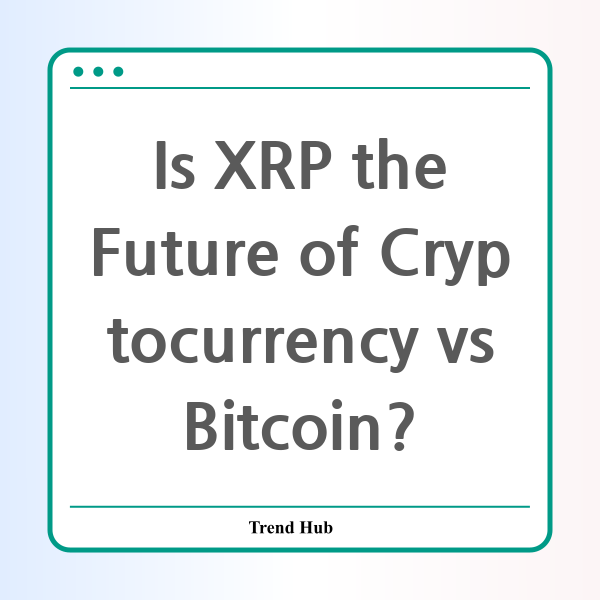* This website participates in the Amazon Affiliate Program and earns from qualifying purchases.

Is XRP the Future of Cryptocurrency vs Bitcoin?
As Bitcoin continues to experience volatility, dipping below the six-figure mark, many investors are faced with a crucial question: should Bitcoin be set aside in favor of other cryptocurrencies like XRP? With a new administration expected to be more crypto-friendly, the landscape of digital currencies is more dynamic than ever.
Bitcoin, often referred to as the "granddaddy" of cryptocurrencies, has long been the go-to option for many investors. Yet, recent shifts in market sentiment have spurred interest in cryptocurrencies that promise faster transaction speeds, lower fees, and innovative use cases. One such cryptocurrency is XRP, which is designed to revolutionize the way we handle cross-border payments.
XRP's Unique Proposition
XRP aims to address a critical pain point in the financial system—high transaction fees and long settlement times. Currently, global financial transactions can take days and often incur hefty fees. With XRP, transactions can be completed in seconds and at a fraction of the cost. This efficiency is attracting attention from financial institutions that are looking to optimize their operations.
This raises an important question: can XRP truly replace Bitcoin in terms of investment return? Let's break down the advantages of XRP:
- Speed: XRP can handle thousands of transactions per second, compared to Bitcoin's mere seven.
- Cost: The fees associated with XRP transactions are significantly lower than those of traditional banking systems.
- Real-World Use Cases: Established institutions are already using XRP for cross-border transactions, highlighting its practical applications.
According to industry estimates, traditional banking systems cost around $193 billion annually in transaction fees. The potential for XRP to capture a significant share of this market is substantial. If successful, this could lead to soaring demand for XRP, potentially driving its price higher as banks accumulate and hold XRP for transactions.
Challenges to Consider
Despite XRP's promising advantages, there are caveats worth considering. While it is true that XRP can facilitate cheaper and faster transactions, the very nature of its fees poses questions about its long-term viability as a stand-alone asset. The fees associated with XRP are negligible, which means the total revenue potential for the network could be far less lucrative when considering the scale of the global banking industry.
Moreover, while RippleNet—the network supporting XRP—offers advantages, many institutions do not utilize XRP for their transactions. This undermines the idea of a looming supply crunch for the cryptocurrency, as institutions may prefer to leverage RippleNet’s capabilities without the volatility and risks associated with holding XRP itself.
Conclusion: The Future of Bitcoin and XRP
Ultimately, the question remains: should investors overlook Bitcoin in favor of XRP? The decision largely hinges on individual investment goals and risk tolerance. Bitcoin has a proven track record as a store of value, while XRP offers innovative solutions for the financial sector. Both assets have their unique strengths and challenges, and the ideal choice may vary based on market conditions and personal investment strategies.
As we move forward into 2025 and beyond, it might be wise for investors to keep a close eye on both Bitcoin and XRP, as each plays a distinct role in the evolving cryptocurrency landscape.
* This website participates in the Amazon Affiliate Program and earns from qualifying purchases.